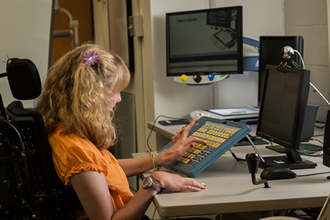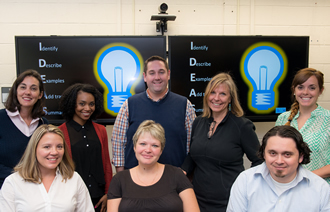2014 Strand and Topics
Strands for Day 1:
Academic
Under the strand, to include but not limited to:
- Individualized instruction
- Effective inclusion strategies
- Universal design for learning
- Use of technology
- Language and literacy
- Educational coaches and peer mentors
- Media and academics
- Impact on faculty development and teacher education which may focus on experiences of licensure, internship, mentors, and volunteer activities
- Person-centered planning
Social and Independent Living
Under the strand, to include but not limited to:
- Strategies and support for social and independent living inclusion
- Peer mentors and social networking
- Sports and recreation
- Promoting self-determination and student involvement
- Improving social and communication skills
- Friendships and lasting relationships
- Transition/ways to prepare to live as independently as possible, including mastering activities of daily living
- Support methods, such as technology
- Transportation access and travel training
- Self-advocacy/self-disclosure/disability identity
- Continuous family support prior, during, and post-higher education
Employment
Under the strand, to include but not limited to:
- Opportunities available
- Student Internships
- Ways to facilitate transition to employment based on person-centered planning
- Ongoing employment supports
- Transition from college to work
- Aligning education content and career readiness
- Service learning
- Sustainability of employment
- Developing portfolios and resumes
- Career planning
- Job search/job development, including using technology
- Collaboration with college career services, employment service agencies and other adult agencies
- Building a relationship with the business community
Student Progress and Measurement Outcomes
Under the strand, to include but not limited to:
- Description of the Admissions process
- How to document satisfactory progress in academics, independent living, vocational/employment
- Develop profile of strengths and needs, and monitor progress to determine growth
- Measurement outcomes, such as formalized testing, portfolios, created assessments
Strands for Day 2:
Promoting Policy and Systemic Change
Under the strand, to include but not limited to:
- Building state-wide and national coalitions including state agencies, advocacy organizations, higher education, and the business community to promote postsecondary education (PSE) for students with ID
- Developing federal and state policy and legislation to provide support and funding
- Developing Memorandums of Understanding (MOUs) among agencies such as schools, IHE, vocational rehabilitation, ID/DD and workforce agencies, etc.
- Successful efforts to develop multiple programs to grow PSE for students with ID
- Positive change for students with ID within a state-wide system of IHEs that involves multiple campuses or community colleges
- Systems change at the regional level involving multiple states, and the role of national associations/organizations
- Systems change as relates to funding
- Promotion of change within a university or college
- Affecting positive attitude change at every level
Program Development and Evaluation
Under the strand, to include but not limited to:
- Key components of program development (and evaluation)
- Funding for students and programs
- Person-centered planning
- Recruitment
- Capacity building
- Strategies for initiating and expanding high quality inclusive programs
- Credentialing & model accreditation standards
- Residential and housing options
Transition to College
Under the strand, to include but not limited to:
- Preparation in K-12 for PSE
- Preparing in middle and high school to go to college
- Access to the general curriculum and universal design for learning
- Individualized supports to access curriculum, participate in employment training, work experiences, internships, etc.
- Collaboration of secondary education and vocational rehabilitation
- Professional development for general and special education staff, school counselors, administrators, etc.
- Focusing on secondary education academics
- Person-centered-planning, self-advocacy and self-determination
- Service learning
- Promoting self-determination and student involvement
- Family support/family involvement
- Student financial aid (FAFSA)
Research and Evaluation
Under the strand, to include but not limited to:
- Evidence-Based Practice
- Participatory research involving IHE faculty, program staff, students and family members
- Determining needed data
- Evaluation methods and results
- Outcome measurements
- Establishing standards of quality
- Definitions and classifications
- Changes across the institution (institutional, administrative or organizational processes) as a result of the PSE program
- Descriptions and empirical evidence related to changes for students without disabilities and/or faculty (attitudes, awareness, skill, and pedagogy)
- Changes in relationships with community organizations, human services, and businesses





